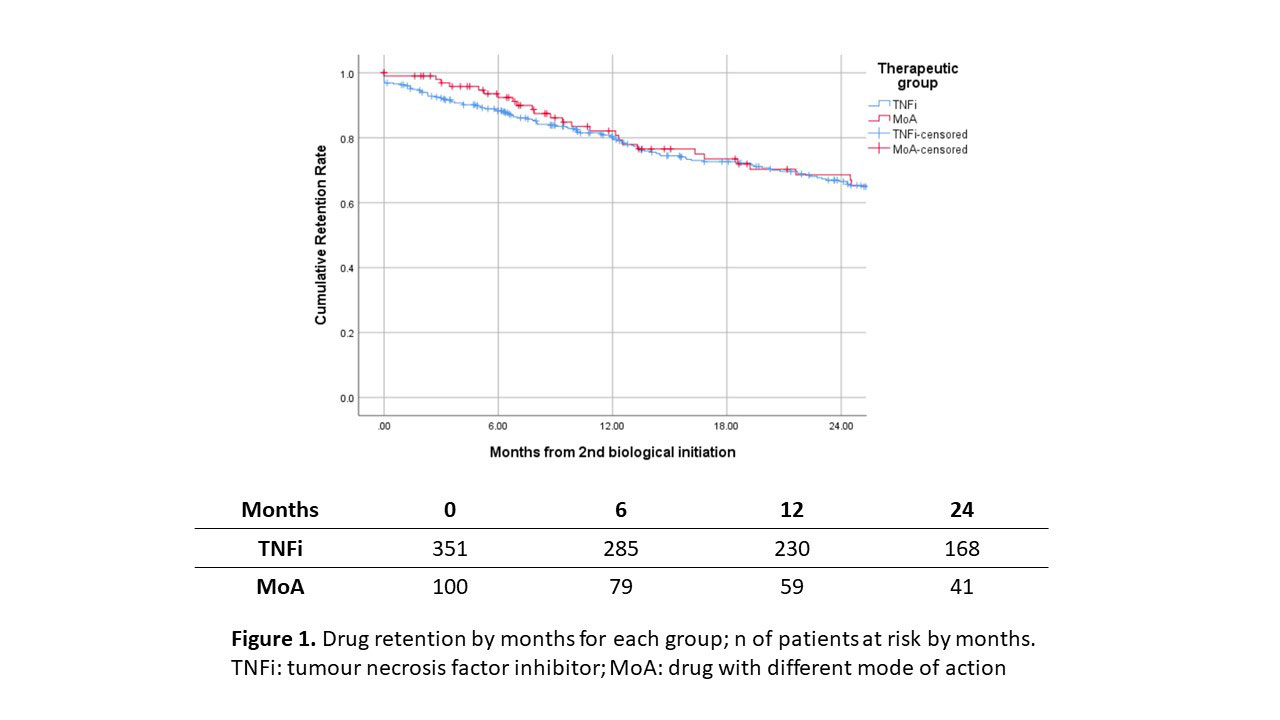Session Information
Session Type: Poster Session D
Session Time: 1:00PM-3:00PM
Background/Purpose: This study aimed to compare the effectiveness and safety of switching to a second tumour necrosis factor alfa inhibitor (TNFi) – “cycling group” – versus a drug with a different mode of action, secukinumab (SEK) or ustekinumab (UST) – “swapping group”, measured by retention rates during a 2-year period of follow-up, in Psoriatic Arthritis (PsA) patients with previous inadequate response to a first TNFi.
Methods: Retrospective longitudinal cohort study with a 2-year period of follow-up using real-world anonymous patient-level data from the Nationwide Portuguese Reuma.pt database. Patients with a diagnosis of PsA, (fulfilling CASPAR classification criteria) with previous treatment failure to a first-line TNFi that started a second biotechnological drug (TNFi, SEK, UST) were included. Sociodemographic data, disease characteristics, disease activity scores and physical function at baseline and after 6,12 and 24 months were recorded. Drug retention was estimated using Kaplan-Meier and Cox models. Crude and LUNDEX adjusted response rates were evaluated at 6, 12 and 24 months. SPSS v25 was used for statistical analysis and significance level was defined as 2-sided p< 0.05.
Results: In total, 454 patients were included, 57.5% were female, with a mean age of 50±12 years old. Baseline characteristics are described in Table 1. Of those, 77.5% initiated a 2nd TNFi and 22.5% a drug with a different mode of action (64 SEK and 36 UST). Most patients discontinued the 1st TNFi due to inefficacy (69.2%), mainly secondary (56.6%).
The retention rates at 6, 12 and 24 months of follow-up time in the “cycling group” and the “swapping group” were 80%/72%/24%; and 82%/74%/27%, respectively. There were no significant differences in drug retention between cycling and swapping strategies (Figure 1), when considering all sample, but also regarding both axial, peripheral, and extra-articular involvement. Older age at diagnosis (HR=1.052, p=0.03), higher DAPSA at baseline (HR=1.059, p=0.013) and extra-articular manifestations (HR=4.854, p=0.015) were independent predictors of suspension of the 2nd biologic.
Regarding peripheral involvement, the proportion of patients in remission or low disease activity (LDA) according to DAPSA at 6, 12 and 24 months was, respectively, 60.0%/58.2%/75.3% for TNFi, 50%/63.2%/50% for SEK/UST. After LUNDEX adjustment, response rates were respectively, 48.6%/43.1%/17.3% for 2nd TNFi, 42.5%/46.8%/12.0% for SEK/UST.
Concerning axial involvement, the proportion of patients in remission or LDA according to ASDAS-PCR at 6, 12 and 24 months was, respectively, 36.8%/50.0%/62.5% for TNFi, 0.0%/50%/20% for SEK/UST. After LUNDEX adjustment, response rates were 29.8%/37.5%/15.6% for TNFi, 0%/33.0%/3.6% for SEK/UST, respectively. In both groups, the main reason for discontinuation of the 2nd bDMARD was inefficacy (p=0.106).
Conclusion: After a 1st TNF inhibitor, cycling and swapping strategies are both acceptable due to similar retention rates. Further studies with greater samples are needed in order to perform survival subgroup analysis regarding different extra-articular manifestations and PsA subtypes.
To cite this abstract in AMA style:
Guimarães F, Pontes-Ferreira M, Soares C, Parente H, Ochôa Matos C, Costa R, Oliveira D, Abreu C, teixeira R, Ferreira Azevedo S, Madruga-Dias J, Araújo F, Campinho Ferreira C, Santos-Faria D, Tavares-Costa J. Cycling versus Swapping Strategies in Psoriatic Arthritis: Results from the Rheumatic Diseases Portuguese Register [abstract]. Arthritis Rheumatol. 2022; 74 (suppl 9). https://acrabstracts.org/abstract/cycling-versus-swapping-strategies-in-psoriatic-arthritis-results-from-the-rheumatic-diseases-portuguese-register/. Accessed .« Back to ACR Convergence 2022
ACR Meeting Abstracts - https://acrabstracts.org/abstract/cycling-versus-swapping-strategies-in-psoriatic-arthritis-results-from-the-rheumatic-diseases-portuguese-register/


